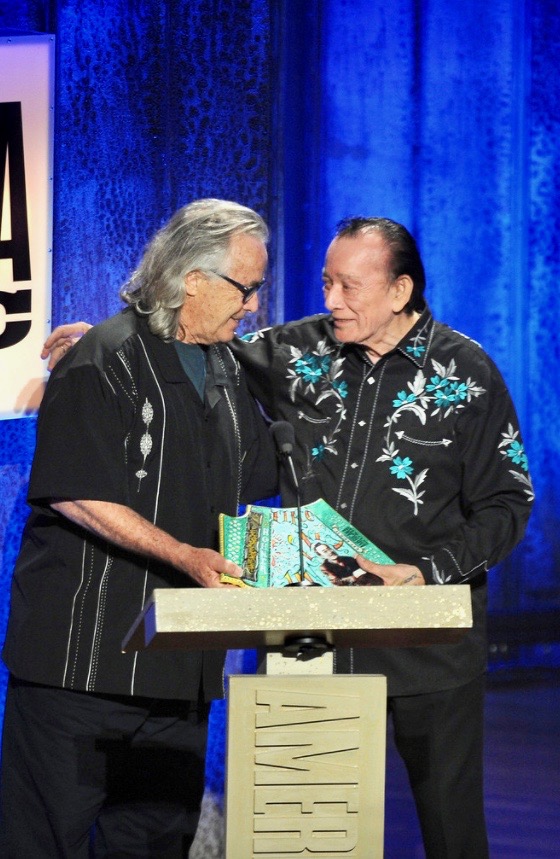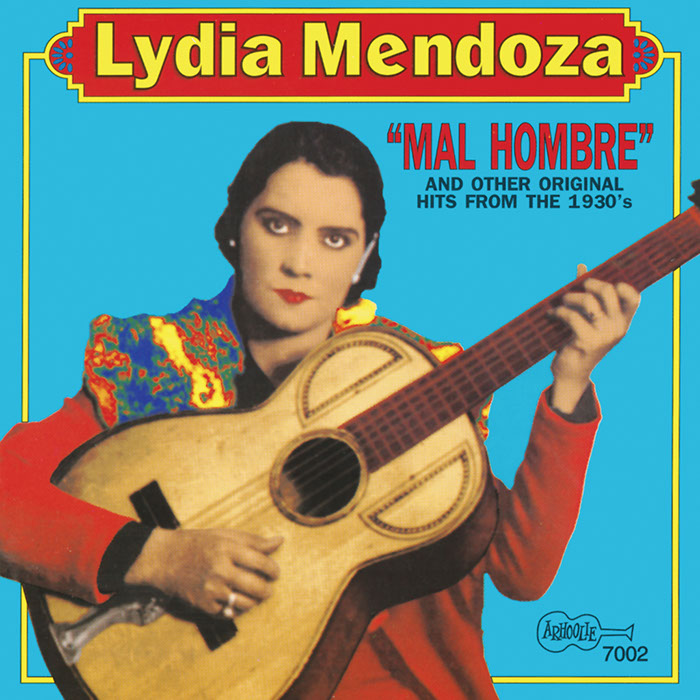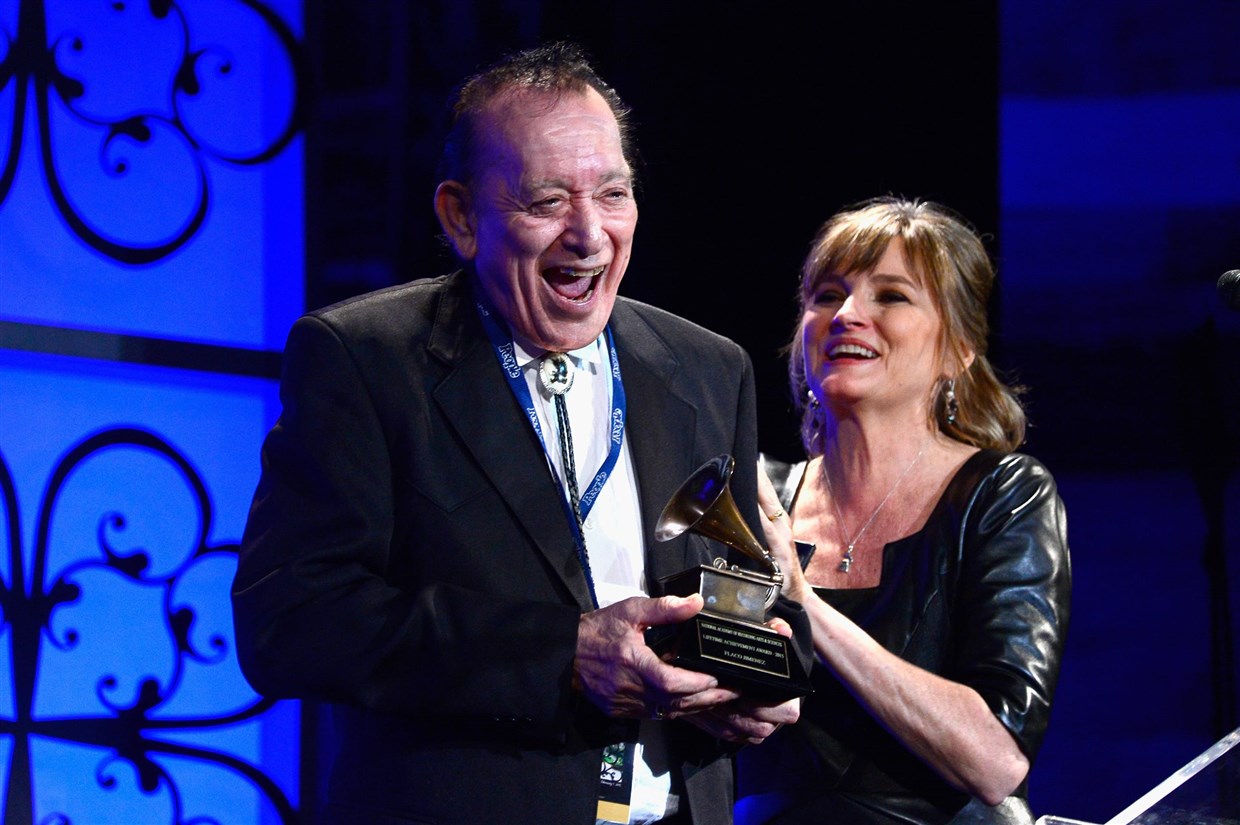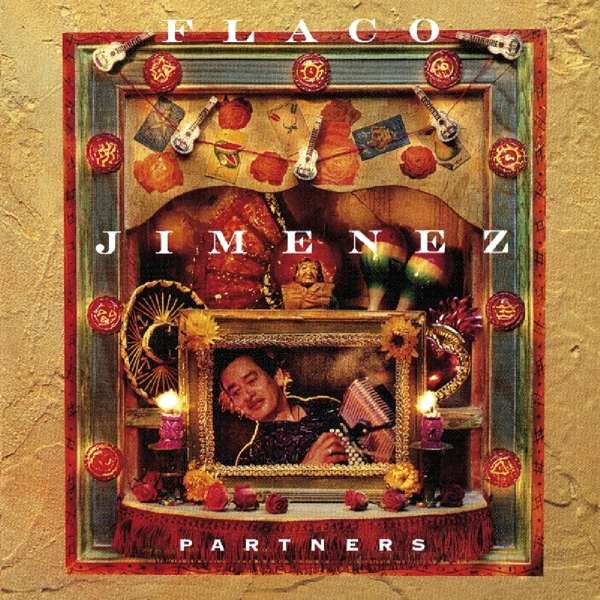
The music business is bloated with award shows that serve as mass marketing events, meant to magnify artist exposure and, hopefully, boost record sales. But there are certain honors that have a timeless impact beyond immediate commercial gain. These are tributes that, rather than publicity, bestow prestige on artists and serve to enhance the legacy of their recordings.
Such is the case with the National Recording Registry (NRR), an exclusive roster curated by the Library of Congress for recordings deemed of special historical significance. Since 2002, the registry has annually added recordings considered to be “audio treasures worthy of preservation for all time based on their cultural, historical or aesthetic importance in the nation’s recorded sound heritage,” according to the program’s website.
Among the 25 works that made the prestigious list for the year 2020 is the album Partners by Flaco Jimenez, the San Antonio conjunto legend whose recordings represent a cornerstone of the Frontera Collection. The Tex-Mex accordion star’s 1992 recording features a variety of musical styles and a host of collaborations with acclaimed U.S. artists Stephen Stills, Linda Ronstadt, John Hiatt, Ry Cooder, Emmylou Harris, and Los Lobos.
“People used to regard my music as cantina music, just no respect,” said Jimenez, 82, in a recent interview. “The accordion was considered something like a party joke … I really give respect to everyone who helped me out on this record, and I’m flattered by this recognition.”
Produced by
Bill Halverson and originally released by Reprise Records,
Partners features 11 tracks in styles as varied as its collaborators. The tunes range from contemporary country to traditional norteño, with Flaco playing accordion throughout and handling vocals on three numbers.
His incredibly flexible accordion adapts easily to disparate genres. He plays with the aggressive edge of an electric guitar, the bouncy delight of a Mexican polka, the heartbreak of a tear-jerk country tune, the boot-stomping rowdiness of a cantina song, the lilting loveliness of a Texas waltz, and the raucous abandon that turns his squeezebox into a bluesy organ.
Cross-genre collaborations are not new to Flaco. His first foray beyond the boundaries of conjunto music came in 1972, at the invitation of the late Doug Sahm, a fellow San Antonian formerly of the rock band Sir Douglas Quintet. Sahm had started his own group, Doug Sahm and the Band, and signed with the newly formed country music division of Atlantic Records, headed by famed producer Jerry Wexler.
With a recording date set in October of that year, Sahm extended a warm Texas invitation to Flaco to become part of the new project featuring other stellar guests.
“He was the one who introduced me to rock & roll,” Jimenez recalled in an interview for the 2001 PBS series
American Roots Music. “He was the one who said, ‘Hey, Flaco, let's go to New York and record this project with Bob Dylan and Dr. John.’ He had that feeling that conjunto could fit in different types of music.”
And Sahm was right. Four years later, Jimenez would work with Ry Cooder, an American roots-music icon whose reputation would help propel the accordion player onto

a global stage. Cooder featured Jimenez and his accordion on three tracks of his 1976 album
Chicken Skin Music, including a slow, hymn-like version of the R&B classic “Stand By Me.”
Jimenez toured internationally with Cooder, giving conjunto music an expansive exposure it never had enjoyed before. Jimenez went on to visit dozens of countries – England, Australia, Japan, Holland, Switzerland, Belgium, Spain, and more – either as a guest with other bands or as a solo act.
“If there's an invitation from any parts of the world, I'll try to be there,” he told PBS.
Jimenez also recorded with major stars in a variety of styles from British rock to Cuban son—so many collaborations, he said, “it would take two days” to list them. “I really appreciate their help, to make people understand that there are channels among cultures.”
Jimenez can be heard on albums by artists such as:
Jimenez was also famously part of a pair of Tex-Mex supergroups –
Texas Tornados and
Los Super Seven – along with Freddy Freddy, Augie Meyers, and, from Los Lobos, Cesar Rosas and David Hidalgo.

Flaco’s history of partnerships gives his nationally recognized album a perfect title.
“Partners is a good example of how he’s a crossover,” Maria Peña, a Library of Congress spokeswoman, said in a statement. “What’s great about this album is it shows his collaborations, not to mention that he’s got a career that spanned seven decades. This is a huge acknowledgement of his work.”
Beyond the accolades, Flaco’s partnerships with non-Latino artists achieved something sociologically significant.

Those collaborations, especially with Anglo musicians, managed to avoid accusations of “cultural appropriation” that dogged cross-cultural works by other artists, such as Paul Simon’s work with South African musicians on
Graceland, his best-selling 1986 album. In fact, the case can be made that Flaco’s alliances worked to the contrary – they helped to weave strong ties between mainstream styles and formerly ghettoized music.
That’s the conclusion of musician and teacher
Erin Bauer, Professor of Musicology at the University of Wisconsin-Whitewater. By the second half of the 20
th century, conjunto music had become “a highly localized and often stylistically stagnant regional genre,” argued Bauer in a
2014 essay published in Rock Music Studies). The transformation of the insular Tex-Mex style was sparked by the pioneering partnership between Jimenez and Cooder in 1976, despite drawing “superficial” suggestions of “inequitable cultural appropriation.”
“This case instead demonstrates that the increasing contemporary mixture of cultures, even among socio-economically inequitable groups, can alternatively produce a valuable and mutually advantageous cross-cultural

consequence,” writes Bauer in the essay entitled “The Participation of Flaco Jiménez on Ry Cooder’s
Chicken Skin Music: Cross-Cultural Collaboration and the (Inter)national Discovery of Texas-Mexican Accordion Music.”
This latest honor from the Library of Congress places Jimenez in a distinguished pantheon of performers whose works span more than a century of recorded sound. This year’s 25 selections were chosen by Carla Hayden, Librarian of Congress, from among 900 nominations submitted by the public, in consultation with the institution’s curators and members of the
National Recording Preservation Board.
In chronological order, the latest additions start with Thomas Edison’s 1878 recording made in St. Louis, Missouri, on a piece of tinfoil, recently restored and considered “quite possibly the oldest playable recording of an American voice.” The list ends with a 2008 episode of the popular NPR program, “This American Life: The Giant Pool of Money,” which is also recognized as the “first broadcast available as a podcast ever named to the National Recording Registry.”
Among other pop music recordings inducted this year:
“Odetta Sings Ballads and Blues” by Odetta (1957)
“Born Under a Bad Sign” by Albert King (1967)
“The Harder They Come” by Jimmy Cliff (1972)
“Late for the Sky” by Jackson Browne (1974)
“Bright Size Life” by Pat Metheny (1976)
“Rhythm Nation 1814” by Janet Jackson (1989)
Singles are also recognized. This year they include the musical tracks:
“When the Saints Go Marching In” by Louis Armstrong (1938)
“Lady Marmalade” by Labelle (1974)
“The Rainbow Connection” by Jim Henson as Kermit the Frog (1979)
“Celebration” by Kool & the Gang (1980)
“Somewhere Over the Rainbow/What a Wonderful World” by Hawaiian singer Israel (“Bruddah Iz”) Kamakawiwo’ole’s (1993)
Two notable spoken-word recordings also made the registry this year: The Christmas Eve radio broadcast by Franklin D. Roosevelt and Winston Churchill (December 24, 1941), delivered shortly after the attack on Pearl Harbor, and the play-by-play broadcast of Roger Maris beating Babe Ruth’s record by hitting his 61st homerun (October 1, 1961), a milestone narrated by Phil (“Holy Cow!”) Rizzuto.
The album by Flaco Jimenez is the only work by a Latino artist selected this year. It joins at least 13 other recordings by Latinos added to the registry since its inception in 2002. Those include “Mal Hombre” (1934), the signature song by
Lydia Mendoza, another key artist in the Frontera Collection’s archive of Mexican American music. Mendoza’s work was added in 2010, along with
an essay about the song written by
Yolanda Broyles-González, University Distinguished Scholar and head of the American Ethnic Studies Department at Kansas State University, and author of the biography,
Lydia Mendoza’s Life in Music/La Historia de Lydia Mendoza” (Oxford: Oxford University Press, 2001).

Jimenez and Mendoza help to balance the overall tilt of the National Recording Registry toward Latino works by East Coast, Caribbean artists. Of the 14
recordings listed by genre as “Latin” on the registry’s website, five are from Mexican-American artists. They include four works from Texans – the aforementioned
Partners and “Mal Hombre,” plus the classic border corrido
“Gregorio Cortez” by Los Trovadores Regionales (the duo of Pedro Rocha and Lupe Martínez), and the Latino pop album
Ven Conmigo by Selena. Rounding out the recordings by Mexican Americans is the seminal Latin Rock album
Abraxas, by California-based Carlos Santana.
Most of the other Latino artists named to the registry in the 19 years since it launched are Cuban or Puerto Rican. Nuyorican bandleader Tito Puente was among the 50 inaugural inductees in 2002, named for his milestone 1958 LP Dance Mania. That debut year ushered in a stellar class with groundbreaking works in many genres. The Mambo King shares the distinction with artists of the caliber of George Gershwin, Billie Holiday, Woody Guthrie, Miles Davis, Bob Dylan, and Elvis Presley.
The only recording by a South American artist that appears on the Latin genre list is Carmen Miranda’s 1939 single “O Que e que a Bahiana tem.” The other seven recordings in the registry’s Latin category, listed by induction year, are:
“Live at Yankee Stadium,” Fania All-Stars (2003)
“Manteca,” Dizzy Gillespie with Chano Pozo (2004)
“El Manisero (The Peanut Vendor),” Rita Montaner and Don Azpiazú (2005),
“Azucar Pa' Ti,” Eddie Palmieri (2009)
“Descargas,” Israel “Cachao” Lopez (2012),
“Celia & Johnny,” Celia Cruz and Johnny Pacheco (2013)
“Lamento Borincano,” Canario y Su Grupo (2017)
However, a few more works by Latino artists are scattered among the other genre categories. In perusing the total roster of 575 recordings, I happened across five others. They include three singles in the Pop (Post-1955) genre –
“La Bamba” by Mexican-American Ritchie Valens (2018), “Rhythm is Gonna Get You” by Cuban-Americans Gloria Estefan and Miami Sound Machine (2017), and “The Girl from Ipanema,” which sparked the Brazilian bossa nova craze, by Stan Getz, Joao Gilberto, Antonio Carlos Jobim, and Astrud Gilberto (1963). Plus, two entries in the Folk genre – the self-titled debut album by Joan Baez (2014), whose father was from Puebla, Mexico, and the single
“La Chicharronera” (2019) by norteño duo
Narciso Martinez and
Santiago Almeida, also native Texans who are key Frontera Collection artists.
In the database, the recordings of Flaco Jimenez appear under
24 separate names, either individually or in collaboration with other performers or co-writers. The vast majority – a total of 664 entries – can be found under his most common appellation,
Flaco Jimenéz, spelled with an accent on his surname. His songs are also identified under

the names
Leonardo “Flaco” Jimenez (4) and, as composer,
Jimenez, F. (10) and
Jimenez, Leonardo (47). Of the recordings with other artists, by far the most numerous (163) are with
Toby Torres, a master bajo sexto player and fellow native of San Antonio, who also owned a record label and recording studio.
The Frontera archive also contains
12 tracks from an album by Flaco and his brother, Santiago Jimenez Jr., titled
El Rey y El Principe de la Música Norteña on the San Antonio-based Lira label. Finally, there are six recordings of Flaco with his revered father, Santiago Jiménez Sr., the patriarch of the accordion clan, which appear in the database on 45-rpm singles as
Don Santiago y Flaco Jiménez (2) and
Santiago Jimenez y Flaco Jiménez (4).
One of those father-son sides is of special note. “Eres Un Encanto” is a flirtatious ditty written by the elder Jimenez and recorded in 1979 on Joey Records, featuring Flaco on bajo sexto guitar backing his father on accordion. The patriarch of the musical family passed away just five years later, at age 71. The song took on a special meaning for Flaco who, in an interview earlier this year with Hector Saldaña of the San Antonio News-Express, added that
“it was my dream” to record his father’s song.
His dream was realized on Partners. “Eres Un Encanto” is one of three Spanish-language tracks on the album which feature Jimenez on lead vocals, including a duet with Linda Ronstadt on “El Puente Roto.” In 1991, a year before Partners was released, Ronstadt had invited Jimenez to join her on one track from her second album of mariachi classics, Mas Canciones, a follow-up to her 1987 smash, Canciones de Mi Padre. The acclaimed vocalist from Tucson, Arizona, went out of her way to make sure Flaco and his norteño/Tex-Mex accordion made it onto the album of mariachi music, a totally separate genre.

“Both being from near the border, (Flaco and I) had a lot in common,” Ronstadt told the
San Antonio Current during an interview last year in connection with the release of her documentary
Linda and the Mockingbirds. “I love that norteño kind of music. I didn’t have it on my record, but I pushed it in that direction just so I could get a chance to work with Flaco…. He’s just an amazing musician and a real character. I liked working with him.”
Flaco’s spirit of collaboration has brought not only good will, but also a wide array of accolades. He has won five Grammy Awards and in 2015 received the Recording Academy’s Lifetime Achievement Award, along with The Be

e Gees, George Harrison, Wayne Shorter, amongst others that same year. Also in 2015 he was awarded the National Medal of Arts, presented by President Obama at a White House ceremony to honorees including Mel Brooks (writer/director), Morgan Freeman (actor), Philip Glass (musician), and Sandra Cisneros (novelist).
In addition, Jimenez has received a Billboard Latin Music Lifetime Achievement Award, a Tejano Music Award, a Texas Medal of Arts, and a National Heritage Fellowship from the National Endowment for the Arts. Last year, Jimenez was honored with the Chris Strachwitz Legacy Award from the Arhoolie Foundation, which is “dedicated to the preservation and celebration of American roots music,” as described by Saldaña, the San Antonio music writer who now serves as curator of the
Texas Music Collection at Texas State University.
Asked in the 2001 PBS interview to explain what roots music meant to him, Jimenez gave an answer that was more than a definition. It was a succinct summary of his musical vision.
“American roots music,” Jimenez said, “is the sharing and blending of different kinds of musics, like a brotherhood thing. It makes the world rounder when there's coordination.”
– Agustín Gurza











Thank You
by Agustin Gurza, 07/19/2021 - 20:57Thanks, Jonny.
This is a valuable compliment coming from a trained musician and well-informed musicologist, such as yourself. Honored to be your colleague.
Agustín
Great Article
by Jonathan Clark (not verified), 05/07/2021 - 01:43Really enjoyed this article, Agustín, and I learned a lot. Keep up the great journalism!